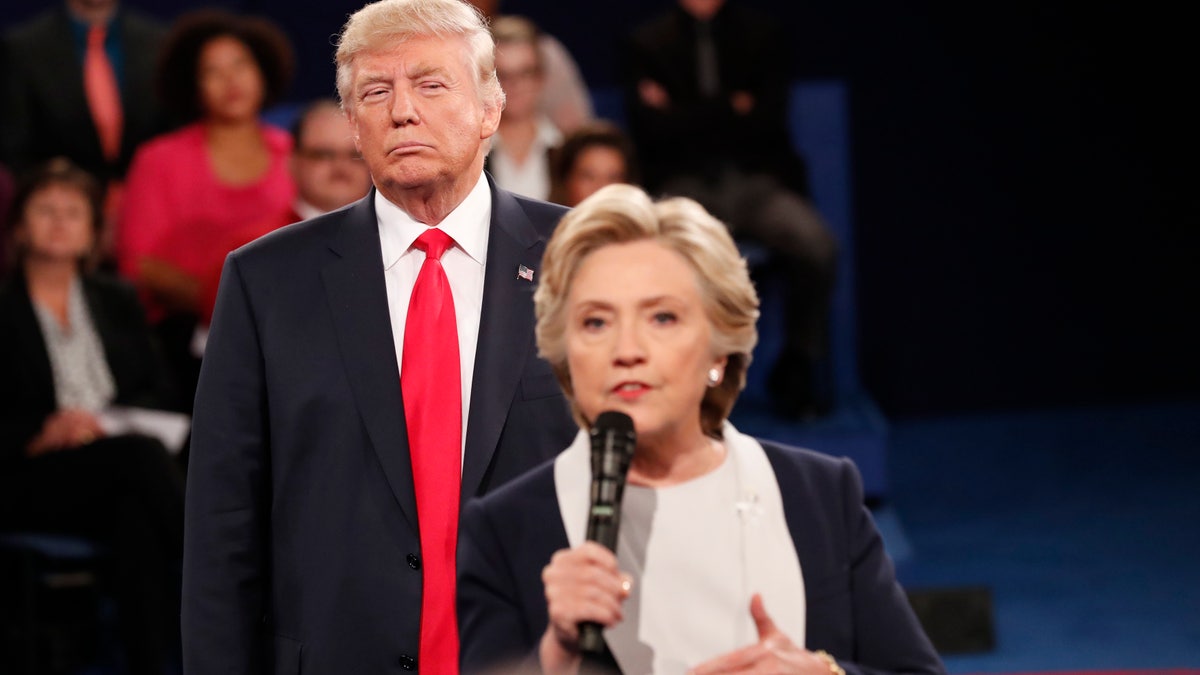
Republican U.S. presidential nominee Donald Trump listens as Democratic nominee Hillary Clinton answers a question from the audience during their presidential town hall debate at Washington University in St. Louis, Missouri, U.S., October 9, 2016. REUTERS/Rick Wilking - RTSRIR9 (REUTERS)
On Nov. 4, 2008, I watched with friends as Barack Obama was elected president of the United States. The future was here. The Oval Office was open to someone like me. It was one of the most pivotal days in my life as African-American, and I had nothing to do with making it happen. I hadn’t voted.
At the time I remember feeling so bogged down, burned out, and borderline depressed by my premed courses at Harvard College, I was simply trying to survive. I knew what was happening in the world, but in my slog toward becoming a doctor, I had no energy left for anything, even a historic election.
My health and poor well-being kept me from fully participating in the political process. As person of privilege, I realize now that if this could happen to me, it could also happen to my patients at the public hospital where I work.
Poor health can keep us from the polls, and in advance of Tuesday’s election, I wanted to do something about it. Health professionals can protect their patients’ right to vote.
More From Stat News
In 2012, only 56.5 percent of Americans who were eligible to vote did, according to the US Census. For those who didn’t, illness and disability were major contributing factors. Nearly 40 percent of non-voters making under $50,000 and nearly half of all elderly non-voters said health reasons kept them from the polls, according to Bloomberg.
Based on federal data on emergency room visits and admissions, I calculate that 1.9 million Americans will visit an emergency room in the five days leading up to the election. In those five days, about 222,000 will be admitted, and their average stay will be about five days.
This means that at any hospital in America come Tuesday, a registered voter who did not submit an early ballot is at risk of missing their opportunity to vote. That number grows when you include the number of people who were healthy enough to be discharged from the hospital, but not healthy enough to get to the polls. This is alarming — patients in low-income communities have higher rates of hospitalization and longer stays compared to wealthier patients from more affluent communities.
This is an issue of social justice, and at my hospital, where we provide care for low-income and vulnerable populations with poorer health than the rest of the community, some of us health professionals are taking action.
The Social Justice Coalition at Cambridge Health Alliance is combating this unrecognized and insidious form of voter suppression by educating hospitalized patients about their opportunities to vote. I am a cofounder of the organization.
Here in Massachusetts, after several calls and a lot of time poring over the laws, I figured out with some help that patients registered to vote can fill out an official absentee ballot application indicating that they have been newly hospitalized within five days of the election. The form lets patients request that an absentee ballot be hand-delivered by an election official or a designated proxy, like a family member or friend. We started on Thursday providing patients with the official forms and helping them contact their local election officials.
Many states have last-minute absentee ballot provisions for medical emergencies. In Virginia, for example, if an eligible voter becomes ill or hospitalized before an election, he or she can vote via emergency absentee ballot. In California, the laws are similar to ours in Massachusetts — proxies, including hospital volunteers, can pick up ballots at election offices on Election Day.
The Social Justice Coalition’s mission is simple: honor the intrinsic and indisputable worth of all people. Promote equity across all domains. Improve the social, cultural, economic, environmental, and political health of the communities we serve.
Read more: I’m a young black woman. Why do so many people assume I’m not a doctor?
Empowering hospitalized patients to vote is part of that mission. Michelle Obama said this recently about New Hampshire in the 2012 election: “The difference between winning and losing this state was only 66 votes per precinct. Just take that in. If 66 people each precinct had gone the other way, Barack would have lost.”
In sickness and in health, our voices are important.
The other cofounder of our organization, Dr. James B. McKenzie, sees it like this: “Voting is the method by which we select the people to decide upon the laws that govern our country, so efforts to remove people from this process are creating a system that will be less responsive to the needs of those people.”
He said we need to fight all forms of voter suppression and counter systems that disempower and decrease the democratic impact of our patients.
We are fast approaching another historic election. For the first time, a woman will be on the ballot for president, and once again we have the opportunity to open the doors of the Oval Office to someone who looks like me.
This time, I took advantage of early voting the first day it was available in Cambridge, Mass. This time, I will have a hand in shaping the future of this country.
Every single one of my patients has the right to do the same.
I hope they will, that all Americans — in the words of President John Quincy Adams — “may cherish the sweetest reflection that your vote is never lost.”
